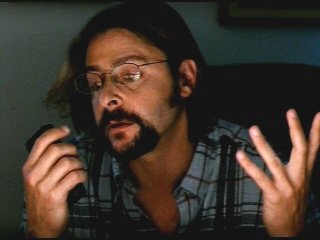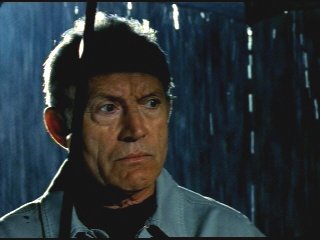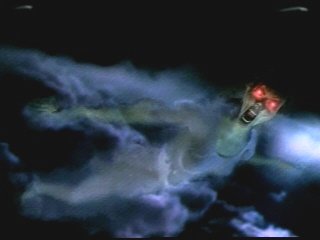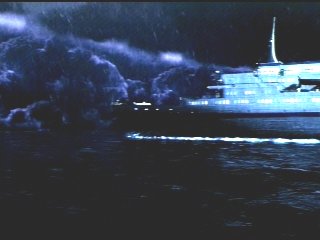
|
|
|
|
|
|
|
|
|
|
|
|
|
(2001) Director: Christian
McIntire
Though the drive-in is essentially dead, and B-movies
are now more or less confined to the video store or cable, there are
still some It isn't that the ideas behind these movies are really any worse than those found in other B-movies - it's more that these ideas generally seem to be beyond their capacity because despite all the effort and resources they pump in, it's still not enough. If you are going to, say, make a movie about a gigantic poisonous snake, or a science fiction actioner concerning scientists piloting a gigantic manned drill into the earth's mantle, you not only need to put an extraordinary amount of work into the special effects so they come across in a convincing enough way, you also need a good enough script (even though these are "genre" films) so that the audience will swallow such outlandish premises. After all, science is smart, and to have it portrayed in a stupid manner will make the results even stupider than your typical dumb action film. Anyway, one of UFO's latest efforts, Lost Voyage, differs from their usual output in several ways. Though it deals with a fantastic premise, it depicts it in a way that, though it would be considered a low-tech rendition, manages to be convincing despite the limited resources at hand. Also, the movie is clearly content to not be something it can't be, happily staying at a tone more sedate than other UFO productions. The most important difference is that Lost Voyage
turns out to be, for once, a good UFO
production. What's unfortunate in this case is that it might not get
the audience it deserves. Possibly due to its premise and its
packaging, splatter fans may believe they will be getting a
blood-and-death movie akin to Ghost Ship (or even Death
Ship), and disappointed that the movie doesn't have this grisly
At this point, most people, whether they are fans of slasher films or not, will assume that very things will start going wrong for everyone on board, and one by one they will start to be bumped off in many gruesome ways every few minutes not long after that point. But in actuality, the results are not too far away from the direct opposite of that expected scenario. This can be clearly proved by reporting that in the first hour of the movie, only one - repeat, one - person meets his demise. It's a death that will stick in your mind, and not because it is filled with gore and blood. The nasty result are in fact only hinted at with some quick (and darkened) shots of affected body parts, but it's enough to get our minds to think how the entire body would look like - and the long and painful screams of the victim just second before are still in our heads. Nothing like your typical death found in a slasher film. In the last half hour, both the body count and the frequency of killings does greatly increase, but even then Lost Voyage firmly avoids descending into a slasher mentality. The subsequent killings have little to no blood found in them; in fact, one victim gets properly dispatched offscreen, so we can only imagine what happened to her. Another difference this horror movie has is that we clearly sense a gigantic malevolent and purely unnatural force behind every one of these killings, a feeling you don't find in a masked psycho movie. Not only that, this force can't be quickly or thoroughly explained, and its mysteriousness just adds to the building atmosphere of dread. Much of the atmosphere of the movie is in fact not
generated by the actual horror sequences, but by all the scenes
in-between them. Except for the first minute of the movie, and one
brief shot near the end, the entire movie takes place at night. The
long night that takes up almost all the entire running time is an
especially harsh one. You can see the breath of the Though certainly a lot of the atmosphere is created by what's brought into the movie, director Christian McIntire (who also had a hand in the script) is also careful enough to make sure there is not too much of some primary material, because overkill in those areas could easily destroy the mood that's in the end results. The score by Rich McHugh is appropriately somber and creepy, and McIntire sees no reason to have to overplay it in both volume and length; much of the movie in fact is music-free, having a restrained and quiet background with the occasional rattle and crash injected so viewers never have enough time to adjust and stop being wary of things that might jump out of the shadows in that dark ship. The ship itself is introduced and subsequently exposed slowly, one room at a time, with plenty of time between the entrance of one room and moving on into the next one. Not knowing everything about the ship right away gives this environment an extra dimension of mystery for much of the movie. And, for once, this particular band of characters has at least some idea that this uncommon situation needs to be approached with at least a certain amount of caution. As soon as they board, Shaw tells everyone not to go out on their own, and not to go in the passenger section for now because they don't know what's out there ("We don't want anyone hurt on this trip.") It's nice for a change to have characters in a movie
like this to not be as stupid as a Lost Voyage is by no means a perfect movie. Though the "hows" and "whys" of a mystery in a movie like this - where the main object is just for the characters to stay alive - many of the questions here are quite glaring in how they are never really answered, or answered in a way that just brings up more questions. What we learn happened to the ship is more or less given an explanation of that it went "there" and brought some of "there" back with it... whatever that means. A significant part of the movie is devoted to Aaron's obsession in finding his father (as well as a wrapped gift box he planned to give Aaron), but neither of these things are resolved to any satisfaction, and just seem to be in here to waste time. Then there are those corpses glimpsed at the end, their identities never revealed. Plus, the movie also has some inconsistencies; it's established that the force on the ship is using people's personal fears against them. So how come the vision that the "bad" character experiences does nothing of the sort? Yes, there are problems here... but those spooky tales you heard around the campfire years ago weren't high class storytelling, yet you remember them and the eerie mood they generated years later. The ambition here was also to pull you in and give you some chills along the journey, a simple task but one that's done pretty well enough to more than make up for any problems.
Check for availability on Amazon (VHS) See also: Amityville Dollhouse, Lifeform, Slaughterhouse Rock |
 independent film
companies that still freely take on the limited market with everything
they've got. Encouragingly, some of these companies were only formed
recently. One of the most high profile of these companies is the
Unified Film Organization - more commonly known and referred to as UFO.
Over the past few years, UFO has made a number of genre movies that are
more commonly found in video stores and cable than other recent B
movies, some of them being Velocity Trap with
Oliver "I Was In Nemesis, Remember?" Gruner,
Python with Casper Van "Was I Ever A Real Star?" Dien, and
Deep Core with Wil "Thank God I'm Finally
Getting Money For Groceries" Wheaton. The fact these movies have
washed-up stars in them may come across to many people as a clue of the
merit of the product, and they would be right. I have found every UFO
film I've seen in the past to be just not very good at all.
independent film
companies that still freely take on the limited market with everything
they've got. Encouragingly, some of these companies were only formed
recently. One of the most high profile of these companies is the
Unified Film Organization - more commonly known and referred to as UFO.
Over the past few years, UFO has made a number of genre movies that are
more commonly found in video stores and cable than other recent B
movies, some of them being Velocity Trap with
Oliver "I Was In Nemesis, Remember?" Gruner,
Python with Casper Van "Was I Ever A Real Star?" Dien, and
Deep Core with Wil "Thank God I'm Finally
Getting Money For Groceries" Wheaton. The fact these movies have
washed-up stars in them may come across to many people as a clue of the
merit of the product, and they would be right. I have found every UFO
film I've seen in the past to be just not very good at all. attitude might react
badly as a result and discourage others from seeing it. But Lost
Voyage
was never meant to be a horror movie with a slasher mentality, despite
having a basic plot similar to those other movies. The sea vessel in
this movie is the SS Corona Queen, a passenger cruise liner that one
night in 1972 vanished during a cruise in the Bermuda Triangle. Among
the crew and the passengers were the father and stepmother of the 8
year-old Aaron Roberts. The trauma of losing his parents at such a
young age not only made Aaron grow up to be Judd Nelson, he becomes a
researcher at an institute for psychic and physical phenomenon, still
having a great obsession for the Bermuda Triangle after all of these
years. His interest is further piqued when one night he is suddenly
given the news that in the middle of a storm in the Triangle, the SS
Corona has been spotted, still intact after 30 years. Tabloid TV
reporter Dana Elway (Gunn, Silk Stalkings) quickly approaches
him with an offer: Would he like to accompany her team and the cruise
line's salvage crew to directly investigate the mystery? Aaron
initially says no, but of course he subsequently has a spooky dream
while asleep in his easy chair that pushes him to join the team. Headed
by cruise line representative David Shaw (Lance Henriksen), Aaron and
everyone else is ferried by helicopter to the ship, which they find
upon landing to be deserted and with no sign of life... seemingly.
attitude might react
badly as a result and discourage others from seeing it. But Lost
Voyage
was never meant to be a horror movie with a slasher mentality, despite
having a basic plot similar to those other movies. The sea vessel in
this movie is the SS Corona Queen, a passenger cruise liner that one
night in 1972 vanished during a cruise in the Bermuda Triangle. Among
the crew and the passengers were the father and stepmother of the 8
year-old Aaron Roberts. The trauma of losing his parents at such a
young age not only made Aaron grow up to be Judd Nelson, he becomes a
researcher at an institute for psychic and physical phenomenon, still
having a great obsession for the Bermuda Triangle after all of these
years. His interest is further piqued when one night he is suddenly
given the news that in the middle of a storm in the Triangle, the SS
Corona has been spotted, still intact after 30 years. Tabloid TV
reporter Dana Elway (Gunn, Silk Stalkings) quickly approaches
him with an offer: Would he like to accompany her team and the cruise
line's salvage crew to directly investigate the mystery? Aaron
initially says no, but of course he subsequently has a spooky dream
while asleep in his easy chair that pushes him to join the team. Headed
by cruise line representative David Shaw (Lance Henriksen), Aaron and
everyone else is ferried by helicopter to the ship, which they find
upon landing to be deserted and with no sign of life... seemingly. characters when they
are in the almost pitch black outdoors, where rain is falling non-stop
during an especially long and loud thunderstorm. Even when they retreat
indoors there is no cheerfulness to be found. The ship's corridors (and
even homes and offices on land) lack light, and you can hear the sound
of rain and thunder coming from the outside. If there's a window
nearby, lightning flashes will make a regular punctuation into the
darkness (though I couldn't help but notice at times that the source of
the light seems to coming from the inside than outside.) The ship
itself is portrayed in several ways, each way giving a contribution to
the movie's atmosphere. Shots showing the ship from the outside are
depicted with CGI. Considering that CGI depictions of large objects in
big-budget movies still have a ways to go, it's not surprising that the
CGI in Lost Voyage doesn't measure up to even that
level. However, it's pretty good for a low-budget movie, and the
nighttime setting does make it look better than if the ship was shown
during the day. A few rooms were inevitably constructed to represent
parts of the ship, and their cramped unfancy look actually does seem
appropriate for an older cruise ship. Some of the movie was shot
on an actual ship (a dry-docked WW2-era vessel), and this on-location
use helps give the movie a more authentic feel.
characters when they
are in the almost pitch black outdoors, where rain is falling non-stop
during an especially long and loud thunderstorm. Even when they retreat
indoors there is no cheerfulness to be found. The ship's corridors (and
even homes and offices on land) lack light, and you can hear the sound
of rain and thunder coming from the outside. If there's a window
nearby, lightning flashes will make a regular punctuation into the
darkness (though I couldn't help but notice at times that the source of
the light seems to coming from the inside than outside.) The ship
itself is portrayed in several ways, each way giving a contribution to
the movie's atmosphere. Shots showing the ship from the outside are
depicted with CGI. Considering that CGI depictions of large objects in
big-budget movies still have a ways to go, it's not surprising that the
CGI in Lost Voyage doesn't measure up to even that
level. However, it's pretty good for a low-budget movie, and the
nighttime setting does make it look better than if the ship was shown
during the day. A few rooms were inevitably constructed to represent
parts of the ship, and their cramped unfancy look actually does seem
appropriate for an older cruise ship. Some of the movie was shot
on an actual ship (a dry-docked WW2-era vessel), and this on-location
use helps give the movie a more authentic feel. bag of rocks. True,
eventually some of these characters do find themselves alone, but the
decisions they made to get themselves in that predicament are more
understandable than usual. These characters aren't perfect - they have
flaws - but even the one among them who turns out to be "bad" isn't
evil, just exposing their greedy side when an unexpected opportunity
suddenly comes up. Shaw might at first seem to be a stern and
by-the-book leader, but he is genuinely shocked when that first death
occurs, and immediately afterwards tells everyone they should get off
the ship now. (Needless to say, circumstances make that
impossible.) Dana is obsessed with getting a good story, but she does
show some genuine sensitivity to Aaron's painful loss. Not only does
the movie take the time to give some depth to these characters, it also
takes the time to just be with them; the movie turns out to not be in
such a hurry to get to the Corona Queen, giving us plenty of time
beforehand to learn about the characters before they all meet, and
during the lengthy helicopter journey to the ship. The characters of
Fields and Das also bring to the movie some laughs with their generally
dry sense of humor, the biggest laugh coming from when a panicked Das
gets into a foul-mouthed argument with Shaw.
bag of rocks. True,
eventually some of these characters do find themselves alone, but the
decisions they made to get themselves in that predicament are more
understandable than usual. These characters aren't perfect - they have
flaws - but even the one among them who turns out to be "bad" isn't
evil, just exposing their greedy side when an unexpected opportunity
suddenly comes up. Shaw might at first seem to be a stern and
by-the-book leader, but he is genuinely shocked when that first death
occurs, and immediately afterwards tells everyone they should get off
the ship now. (Needless to say, circumstances make that
impossible.) Dana is obsessed with getting a good story, but she does
show some genuine sensitivity to Aaron's painful loss. Not only does
the movie take the time to give some depth to these characters, it also
takes the time to just be with them; the movie turns out to not be in
such a hurry to get to the Corona Queen, giving us plenty of time
beforehand to learn about the characters before they all meet, and
during the lengthy helicopter journey to the ship. The characters of
Fields and Das also bring to the movie some laughs with their generally
dry sense of humor, the biggest laugh coming from when a panicked Das
gets into a foul-mouthed argument with Shaw.